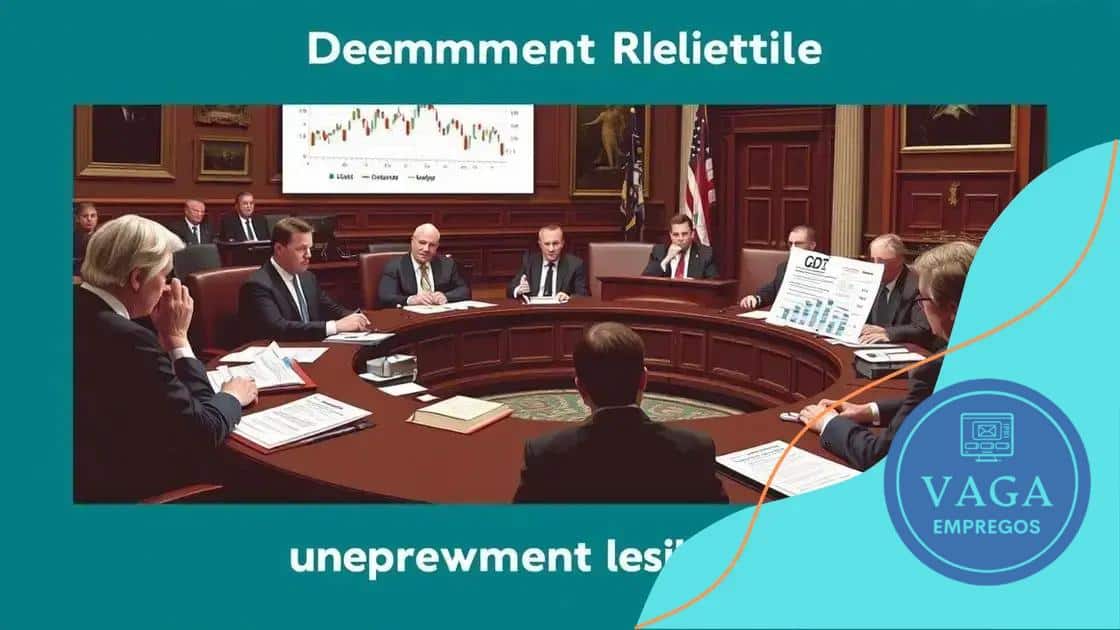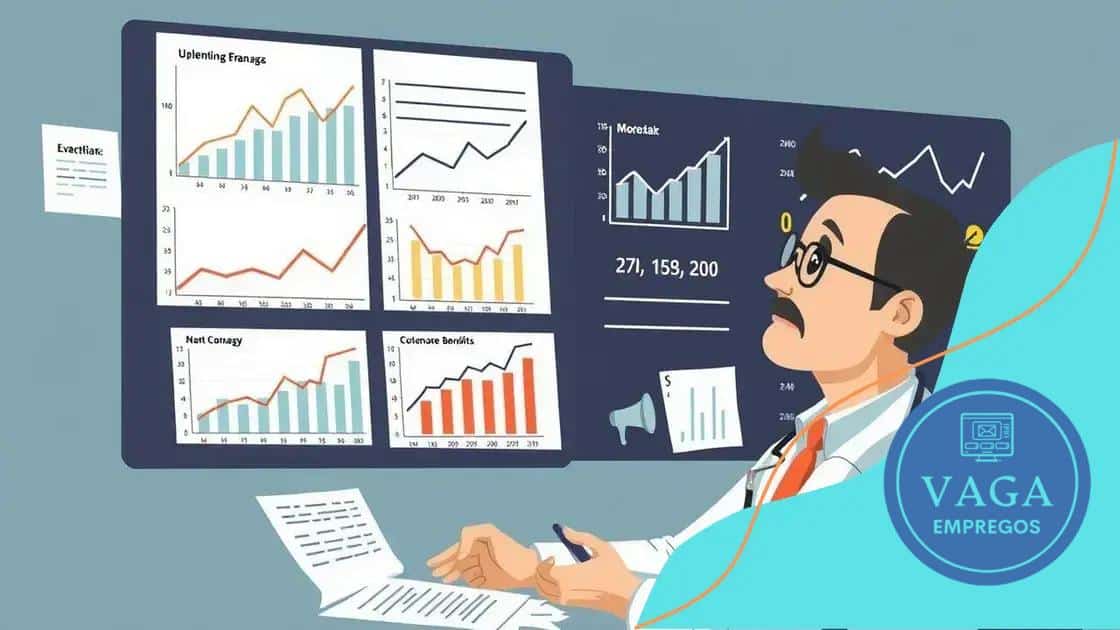Debates over unemployment duration resurface in Congress

Advertisement
Debates over unemployment duration resurface in Congress as lawmakers seek to balance effective support for job seekers with the need to encourage a robust job market and economic recovery.
Debates over unemployment duration resurface in Congress, reigniting discussions on how best to support those affected. What are the implications for job seekers and the economy?
Advertisement
Current state of unemployment policies
The current state of unemployment policies is critical as it affects millions of workers across the nation. Policymakers are constantly addressing the needs of the unemployed while balancing budgetary constraints and economic implications. With the economy experiencing fluctuations, it’s important to understand how these policies adapt to changing circumstances.
Advertisement
Overview of Unemployment Benefits
Unemployment benefits provide temporary financial assistance to eligible workers who lose their jobs. These benefits are crucial for individuals as they help stabilize household incomes and stimulate the economy by maintaining consumer spending. However, the amount and duration of benefits vary significantly from state to state.
Federal vs. State Programs
Each state administers its own unemployment insurance program within federal guidelines. This leads to differences in coverage and compensation. Federal programs supplement state systems, especially during economic downturns, to provide additional support to those in need.
- State benefits often last up to 26 weeks.
- Emergency programs can extend benefits during severe economic crises.
- Eligibility criteria vary widely among states.
As debates over unemployment duration continue, many question whether current durations are sufficient in today’s job market. The mismatch between job openings and the skills of the unemployed has become a growing concern, prompting discussions on reforming these policies.
Recent Changes and Proposals
In recent months, Congress has proposed various changes to unemployment policies aiming to enhance support for those laid off. These proposals often emphasize increasing the availability of job training programs to help the unemployed re-enter the workforce more effectively.
Monitoring the ongoing discussions in Congress gives us insight into how unemployment duration may evolve. Factors like public opinion and economic data will play significant roles in shaping future unemployment policies.
As we follow these developments, the impact on workers and the economy will be closely watched. Understanding the interplay of state and federal programs is essential for grasping how these changes will ultimately affect job seekers in our nation.
The impact of recent legislation

The impact of recent legislation on unemployment policies is significant and cannot be underestimated. Recent laws have altered the landscape of support systems for unemployed individuals, often aiming to enhance their financial stability during challenging times. These changes have been met with both praise and criticism as lawmakers navigate the complexities of economic recovery.
Key Legislative Changes
Several key pieces of legislation have been introduced to improve unemployment benefits. These laws seek to expand access and increase funding for programs that assist those who are out of work.
- Increased benefit amounts, providing greater financial relief.
- Extension of benefits duration during economic downturns.
- Funding for job retraining programs to help workers adapt.
The effectiveness of these policies can be seen in the way they have created a safety net for many families. As the economy faces ups and downs, having robust unemployment benefits is crucial for maintaining consumer confidence and spending.
Challenges and Critiques
Despite the positive impacts, recent legislation has faced challenges. Critics argue that extended benefits can disincentivize job searches, leading to questions about the balance between support and personal responsibility. Additionally, funding for these programs often relies heavily on state budgets, which vary widely across the country.
The key to finding the right solutions may lie in continuously assessing the impact of recent legislation and its effectiveness. Stakeholders, including lawmakers, economists, and citizens, are engaged in ongoing discussions to refine these policies. As new data emerges, adjustments may be necessary to better serve the needs of the unemployed while fostering economic growth.
Ongoing monitoring will be essential in determining how these legislative changes influence employment rates and overall economic health.
Voices from affected citizens
Listening to the voices from affected citizens provides important insights into the real impact of unemployment policies. Many individuals encounter significant challenges when job loss occurs, and their stories highlight the human side of economic decisions.
Personal Stories of Struggle
Each story reveals how unemployment affects daily life and family dynamics. Many workers express feelings of anxiety and uncertainty about their future. They may worry about financial stability, healthcare access, and the ability to support their families.
- Some citizens have shared that losing a job has led to increased stress and emotional challenges.
- Others struggle to find work due to a mismatch of skills and available jobs.
- Many emphasize the importance of unemployment benefits in helping them get through tough times.
When discussing these experiences, it’s clear why unemployment duration remains a vital topic. People often rely on these benefits to cover basic living expenses, such as rent and groceries. The prospect of losing support can leave many feeling vulnerable and isolated.
Community Support and Resources
Several citizens have taken advantage of community programs designed to assist those experiencing unemployment. These resources often provide job training and networking opportunities. Though being unemployed can be lonely, many find solace in connecting with others facing similar challenges.
People have shared how community support can be a lifeline, offering not just financial assistance but also emotional encouragement. Organizations help bridge the gap between job seekers and employers, creating pathways to new opportunities.
As we examine the stories of those impacted, it becomes evident that the struggle does not end with job loss. The ripple effects of unemployment can affect families and communities for years to come. Therefore, the need for accessible and effective unemployment policies is essential.
Economic consequences of extended benefits

The economic consequences of extended benefits are significant and far-reaching. As lawmakers debate the duration and amounts of unemployment assistance, it’s vital to understand the broader impacts on the economy and job market.
Short-Term Benefits
In the short term, extending unemployment benefits provides critical support for individuals who have lost their jobs. This financial assistance helps many families meet basic needs, such as housing and food. When people receive benefits, they are more likely to spend that money in their local economies, which can stimulate growth during downturns.
- Increased consumer spending can help prevent a deeper recession.
- Communities benefit from the money injected into local businesses.
- Families experience less financial stress, which can lead to better mental health.
However, these short-term benefits can come with long-term economic implications. While financial support is essential, there are concerns regarding potential disincentives for job seeking.
Long-Term Economic Implications
Extending benefits for prolonged periods may lead to a higher unemployment rate if individuals feel less urgency to find new jobs. Some economists argue that this can hinder overall economic recovery. When benefits are too generous or too long, it may create a dependency on government assistance, making it harder for some to re-enter the workforce.
Employers might also face challenges in filling positions, especially in sectors where jobs are available but applicants are scarce. The mismatch between available jobs and the workforce can lead to fluctuations in wages and affect overall productivity.
As the debate continues around unemployment duration, it is essential to weigh these economic consequences. Finding a balance between providing adequate support and encouraging job growth will be crucial for long-term recovery. Ongoing analysis and feedback from both workers and employers can help shape effective policies that promote a stronger economy for everyone.
Future outlook on unemployment benefits
The future outlook on unemployment benefits is a topic of great importance as the economy continues to evolve. Policymakers are increasingly focused on how to create a system that effectively supports individuals while also encouraging a robust job market.
Potential Changes to Legislation
As the job market shifts, discussions about potential changes to unemployment legislation are gaining momentum. Lawmakers are considering options that could enhance the benefits while ensuring that job seekers are motivated to re-enter the workforce.
- Implementing time-limited benefits to encourage quicker job searches.
- Increasing training programs to help workers gain new skills.
- Adjusting benefit amounts based on local living costs.
These changes could create a more dynamic support system that aligns with the needs of both workers and the economy.
Technology and Job Support
Advancements in technology may also shape the future of unemployment benefits. The rise of remote work and gig economies has generated new job opportunities, necessitating new approaches to unemployment assistance. Programs may need to adapt to help people in non-traditional work settings.
Job-seeking resources like online platforms can make it easier for individuals to find work. By integrating technology into unemployment services, individuals may receive faster assistance and better access to job listings. This approach can help bridge the gap between job seekers and employers.
As we consider the future outlook on unemployment benefits, it’s crucial for policymakers to remain adaptable. Continuous feedback from those affected by these policies will be essential for creating effective solutions that address the unique challenges faced by today’s workforce. Investing in the future of unemployment benefits can enhance economic resilience and support individuals in achieving financial stability.
In conclusion, the future of unemployment benefits is closely tied to the economic landscape and the needs of workers. As discussions continue among lawmakers and stakeholders, it is essential to consider how best to support those facing job loss while encouraging a healthy job market. This balance can help individuals regain financial stability and promote a thriving economy. By adapting policies to meet the challenges of today’s workforce, we can create a more resilient support system for unemployment benefits.
FAQ – Frequently Asked Questions about Unemployment Benefits
What are unemployment benefits?
Unemployment benefits are payments made by the government to individuals who have lost their jobs, providing financial support during their job search.
How long can I receive unemployment benefits?
The duration of unemployment benefits varies by state, typically ranging from 12 to 26 weeks, but can be extended during economic downturns.
What factors affect my eligibility for unemployment benefits?
Eligibility can depend on reasons for job loss, previous earnings, and state-specific requirements, which may include actively seeking work.
How can extended benefits impact the economy?
Extended benefits can provide necessary support to families, stimulate local economies through spending, but may also affect the job market by influencing job search behavior.





